Looking to buy a new hot water tank for your home? Check our our HOT WATER TANK BUYER’S GUIDE before you purchase!
Looking to buy a new hot water tank for your home? Check our our HOT WATER TANK BUYER’S GUIDE before you purchase!

A new hot water heater is a major investment, both initially, and long term. Indeed, “The cost of heating water consumes almost 20 percent of your household budget” – (Consumer Reports)
Choosing your hot water heater is a big decision, and you want to know as much as possible beforehand to ensure you find a reliable, cost-effective and efficient hot water heater.
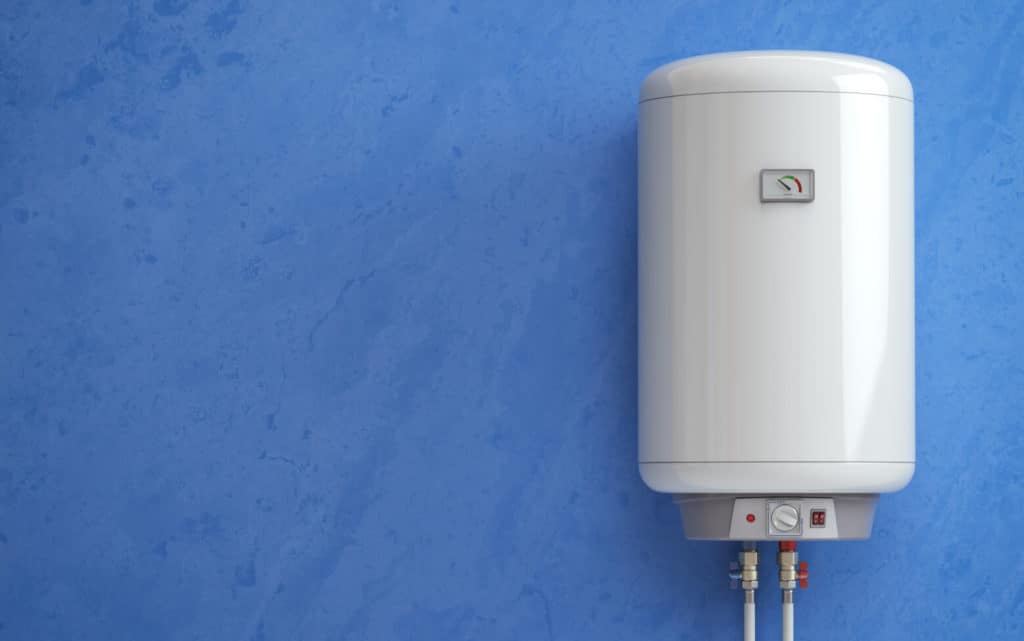
We know you have plenty of options when it comes to choosing a new hot water heater. With so much to choose from, we want to help narrow down your search and simplify the process to make buying a new hot water heater as easy and seamless as possible. We also aim to help educate those looking, to help them make informed buying decisions.
Before we get into the details, let’s start at square one and dive into a quick refresher on how a typical hot water heater works.
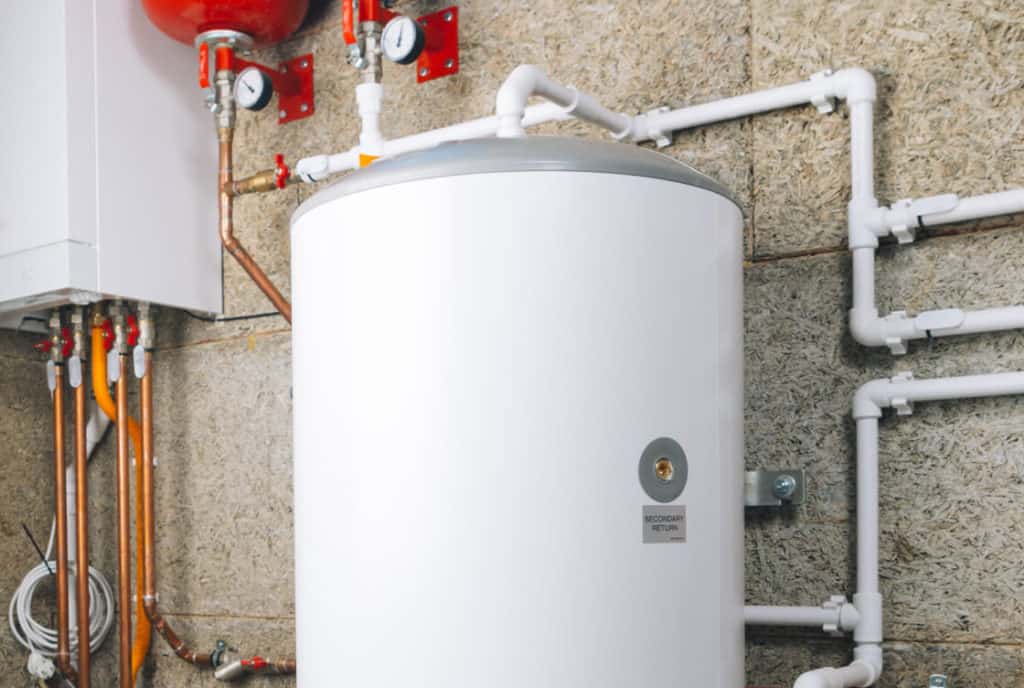
Hot water tanks are still the most common and widely used form of heating water. In the most basic sense, hot water tanks are used to heat water and store it at a set temperature, in the tank, so it is hot and ready to use when you need it.
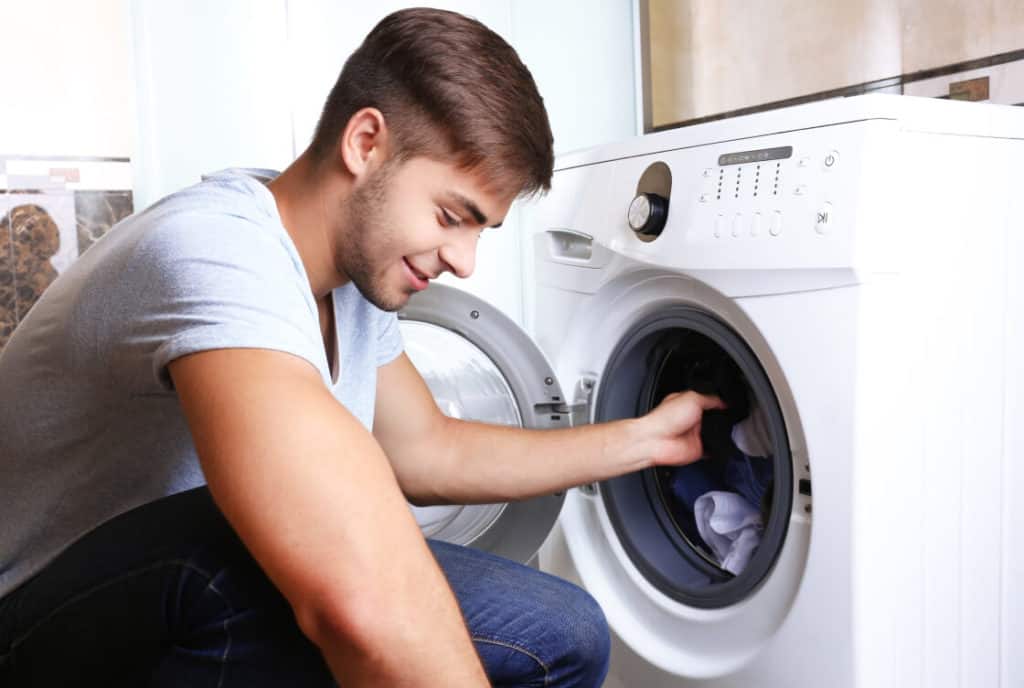
When you turn on the tap, put clothes in the wash, run the shower or wash a load of dishes, you are using the reserve of hot water in your hot water tank. This water flows through your pipes, directly from your storage tank.
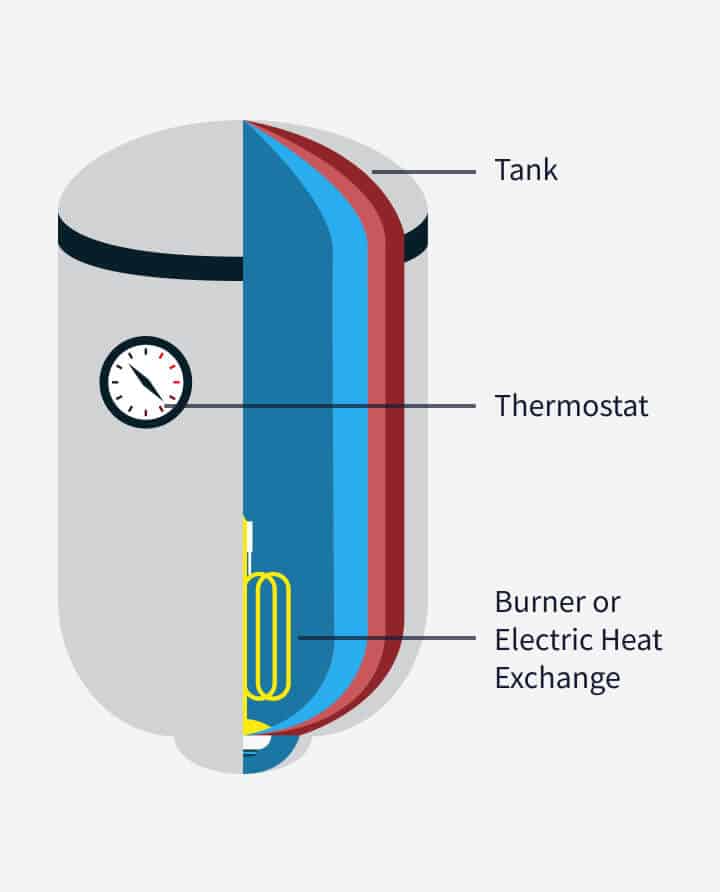
Most traditional hot water tanks on the market today are made up of a few simple key parts including a tank, a thermostat to measure the temperature of the water and a burner, or an electric heat exchange to heating the water in the tank.
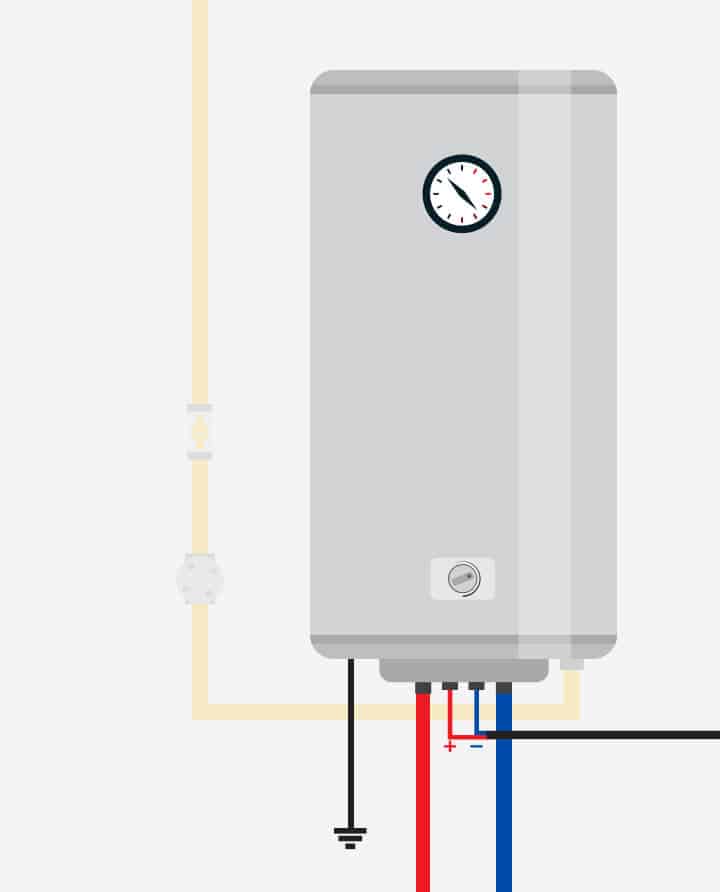
The hot water tank is connected to the water supply in your home and when hot water is used, new freshwater is pumped in and heated. In cases where you are using hot water at a rate faster than the hot water tank can heat water, the water will run cold.
This is a common experience for many hot water tank owners but is one that can be avoided by choosing a large enough tank size for your usage needs.
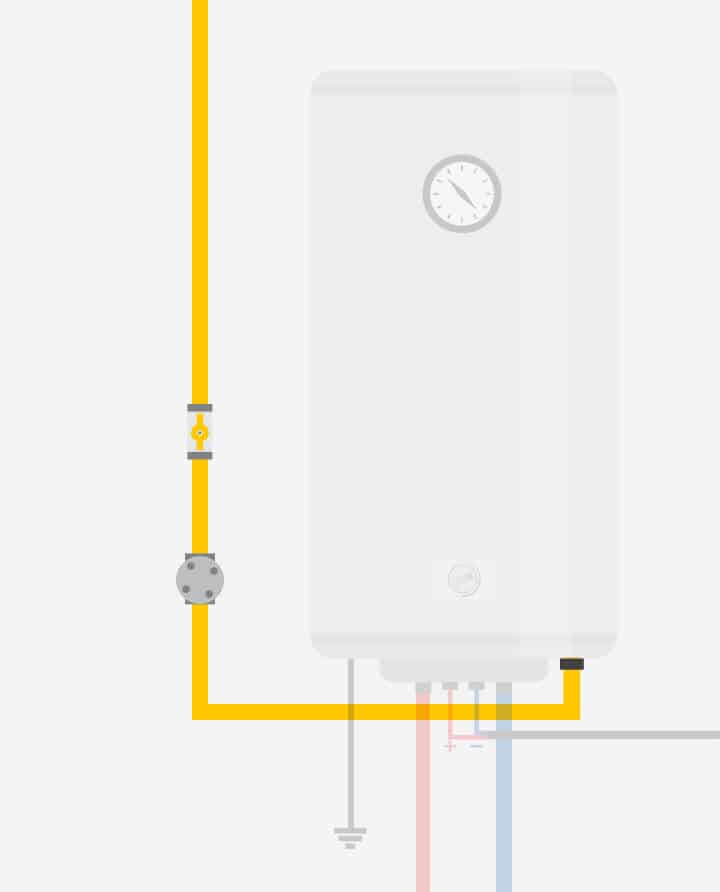
Modern water heaters also come with a pressure valve for your safety. This means that if there is pressure in the tank, water can be released safely without building up or causing leaks.
Likewise, your hot water tank will also be insulated, to keep the heat from escaping. This makes the tank more energy efficient, the less heat escaping means your home uses less energy.
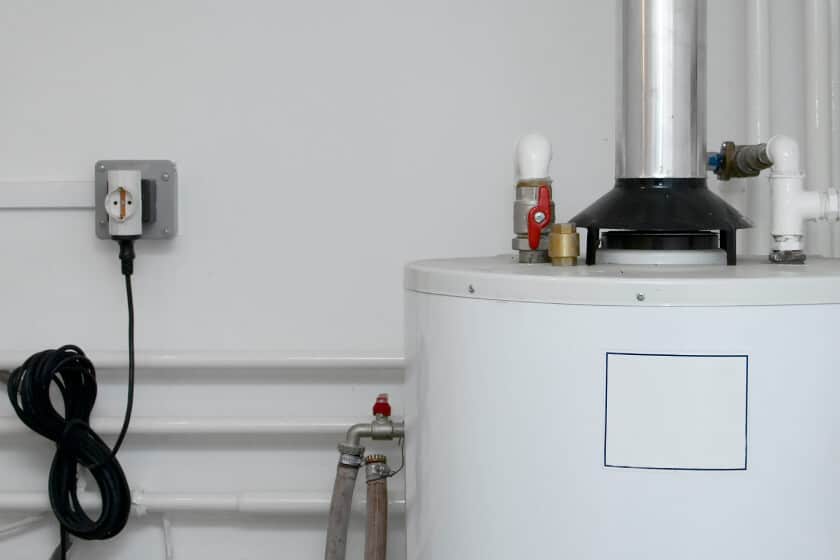
The two most common forms of energy used to heat you hot water are gas/propane and electricity. The two methods vary, however they are both effective at efficiently heating your hot water tank. Let’s explore the pros and cons of gas powered vs electric hot water tanks.
Many conventional hot water tanks in Canada use natural gas as the main source of energy to heat and store water. If you are switching from an electric to gas powered hot water tank, keep in mind that gas powered tanks require additional venting, and a direct connection to natural gas.
Gas powered water heaters typically have a higher upfront cost, but they save money in the long run. They heat water quickly and effectively, whereas electric hot water tanks take large amounts of energy to heat tanks and hold them at a steady temperature.
Electric hot water tanks vary slightly in build from gas powered tanks. They are most often made out of a heavy metal such as steel and they have thermostat controls to help you set the temperature of the tank.
They heat the tank from the top down, so this means that if you are using hot water quickly, the tank will heat the water at the top first, which is leaving the tank so you are less likely to be shocked by cold water. These tanks are lined with ceramics to prevent corrosion and insulated with special foam, in order to retain as much heat as possible. There is no venting or exhaust pipe needed for electric water tanks.
If you are considering a new way to heat the water in your home, tankless hot water heaters are an excellent alternative to the traditional style. Tankless water heaters are modern options known for their energy efficiency, small size and robust heating power.
They are much smaller when compared to traditional water heaters and they take up less space because they do not require the added room for a large tank.
They can be both gas-powered and electric and they heat water in a different way, on-demand, rather than keeping a reserve in a tank. This gives them the alternate name – ‘on-demand water heaters.’ This style of heating is what makes these appliances so energy efficient, they only use energy to heat water when you need it, rather than heating it constantly.
With tankless models, you get a virtually unlimited supply of hot water. You will never have to take a cold shower again. They do come in different sizes, however, and have different output levels, just like traditional hot water tanks. The GPM or gallons per minute indicate the max capacity or the maximum amount of water your tankless model can heat each minute. If you have a larger household, it is likely you will want to look for a model that can keep up with your peak daily hot water use.
The downside to tankless water heaters is that there is a higher up-front cost when compared to their traditional counterparts. However, the energy that they save in the long run, combined with their longevity of 15-20 years could make the initial investment worthwhile.
As an added incentive there are new Fortis rebates that encourage buyers to go tankless, due to their increased energy efficiency.
Ultimately the choice is yours, however, tankless water heaters are certainly an excellent option to consider.
It is important to carefully evaluate the energy efficiency of a hot water tank before you make a purchase decision. In Canada, modern models are required to comply with the energy efficient regulations of this country. But models labelled with the ENERGY STAR guarantee have been extensively tested and have proven to be highly energy efficient. The biggest benefit to purchasing an energy efficient water heater is the savings you will reap long term. Think about the amount of energy it takes to heat the hot water you and your family use on a daily basis, factor that into a year and the savings can really add up. Energy efficient models are also safer for our environment.
FortisBC offers rebates when you choose an energy efficient water heater. Visit their site to view their list of qualifying models and get between $200-$1000 back in rebates.
Water tanks come in many different sizes. At first glance, they may all look the same, however, the size of your hot water tank is very important and choosing the right tank size for your home will depend on several factors. The size of your water tank will be based on your usage and hot water needs. Before you buy, ask yourself how much water you will be using,
You don’t want a water heater that’s too small or you will risk running out of hot water while you are using it, such as while you are running a shower or bath. But on the other hand, you do not want a water tank that’s too large either because you will waste a lot of money and energy keeping the water in the tank hot, if you do not use it frequently.
If you are buying a water heater with a tank, or replacing an existing water tank, one way to determine the size you need is to ask yourself if you have ever run out of hot water while using your existing water tank. If you always run out of hot water, it’s a good indication that you require a larger tank. Water heaters built in more recent years are all far more energy efficient than older heaters from before the mid 2000’s.
This is simply because manufacturers were required to make the exterior of the tank better insulated in order to retain heat and save on energy. But this can be problematic if you are replacing a large water tank that is already fit into a small area, such as a closet on your home. Newer large tanks will be a few inches wider than their older counterparts which means that you may need to accommodate for the extra size if you are looking for a larger tank. Make sure you measure the area where you will store your water heater very carefully before you order and install it.
When you are trying to determine the size of tank you need, it’s also a good idea to consider the peak time of day you or your family use hot water. Hot water usage varies greatly depending on the amount of people living in your home. Think of the times during the day when you are all home and using hot water in some capacity.This could be in the morning, when you shower, run the dishwasher or do laundry, but every household is different, and peak times can vary. Peak usage times help you to determine the maximum gallons of water you use in a day, which translates into the gallons you need your tank to hold. It tells you how much hot water you need. Gallons broken down by activity can be added up to calculate the max amount you use.
Calculate the amount of hot water you and your family would use during peak times to get a good sense of the size of tank you need. Use this Energy Cost Calculator for Electric and Gas Water Heaters to get started.

Once you have a set number in place and you are looking for a new tank, pay close attention to what’s called the first hour rating. This is a standard measurement which is mandatory on all water tanks. The first hour rating is often displayed on the front of the water tank and it is the amount of hot water that tank can supply in an hour. Therefore, if your peak hot water usage is 40 gallons, you need to be sure your hot water tank has a first hour rating of at least 40 gallons, if not more. Consider the amount of users and water required during peak times in your household, and use your existing water usage as a gauge to determine the size of tank you will need. Avoid overestimating your usage because the amount of energy required to heat a large tank can be costly in the long term.

The typical lifespan for a hot water tank is around 8-12 years. This means that you are making a long term investment when you are looking for a new one. Before you purchase a hot water tank, it is always best to check the warranty information, especially considering that this product will have to remain functional for years to come. You should be aware of the warranty timeline as well as any clauses or concerns.
Warranties are meant to protect you, the buyer, in the event that your hot water tank fails before the end of its expected lifetime. Warranties can be as short as one year, or as long as 10. It is not always the case, but companies that offer longer warranties often use better materials and products to ensure the water tank lives up to the promise of lasting for years without failure. When you consider the price of your water heater, pay attention to the warranty information for each price range. If you find a cheaper water heater with a shorter warranty, be wary and consider the long term effects of your purchase. Look into extended warranties where available to help protect yourself and your property in the event of tank failure.
There is a lot of thought and effort that goes into choosing a new hot water tank. With so many different things to consider, it can be difficult to prioritize exactly what matters the most. Here is a summary of what has been outlined in this guide, to help you make a more informed decision about your purchase.
"*" indicates required fields
If you are looking for advice on choosing a new hot water tank, the team at Hillcrest Plumbing and Heating would be happy to assist you. A new hot water tank is a large investment, and you want to make the right choice to ensure it lasts for years to come.
The experts at Hillcrest Plumbing and Heating can help to suggest a water tank that meets your needs and budget. With over 50 years of experience in this industry, you get expert knowledge and advice when you contact our team.
Hillcrest Plumbing & Heating | 212 E 17 Avenue, Vancouver, BC, V5V 1A7 | Privacy Policy
© 2025 Hillcrest Plumbing & Heating